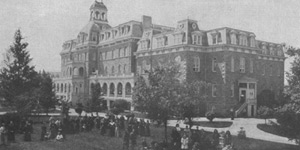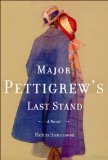I have a problem with twins. Nothing personal, you understand. In fact I have a pair myself and two more beautiful, wondrous children it would be hard to find (I may be biased here).
No, my problem is with twins in literature. And the problem is that, in books, no-one is ever just a twin. No, being a twin is always a plot device. If you are reading a detective story and someone mentions that they have a twin, look no further for the killer. If your taste is for lighter fiction and a character has a twin, brace yourself for hilarious romantic complications. Phoebe and Ursula In Friends are prime examples. In a comedy, you are bound to kiss your boyfriend's twin brother; in a crime novel, your long-lost twin is very likely to kill you. Incest, yes. Mistaken identity, yes. Good and evil, yin and yang. Yes, yes, yes.
 As a child I was utterly possessed by the past which came to me in books; it seemed somehow a better, more orderly place where I could be myself and live a fuller life. "....to come back to where we started and know the place for the first time," says the great poet T.S. Eliot in his Four Quartets. Is it that time is an illusion, that in some way outside of our small sphere people float freely between ages?
As a child I was utterly possessed by the past which came to me in books; it seemed somehow a better, more orderly place where I could be myself and live a fuller life. "....to come back to where we started and know the place for the first time," says the great poet T.S. Eliot in his Four Quartets. Is it that time is an illusion, that in some way outside of our small sphere people float freely between ages?
Some historical writers feel they are called by the past; some feel they actually lived there. Do we re-imagine former lives, or somehow, deep inside us, do we remember them? While researching my latest novel on Monet, I got teary finding a street in Paris where he lived when twenty-five, when no one wanted his paintings and when he first fell in love. I sensed his hope and despair.
 I look through my bookshelves, not at the high stacks of unread books, both classics and hot new titles, but at the ones I have already read and have not come to the end of. That small minority of books that don't disappear from the mind after the last page is read. For the serious lover of literature, one of the most essential parts of being a reader is being a rereader.
I look through my bookshelves, not at the high stacks of unread books, both classics and hot new titles, but at the ones I have already read and have not come to the end of. That small minority of books that don't disappear from the mind after the last page is read. For the serious lover of literature, one of the most essential parts of being a reader is being a rereader.
In my writing classes, most of my students tend to be professionals, very smart and opinionated, used to being successful in their own areas of expertise. When we talk about why we read, the divide always comes down to reading for entertainment or reading for spiritual nourishment. The best books provide both, and because of that dual ability, it is essential to read the first time just for the pleasure of letting the story wash over you, just to get the lay of the land, to find out that most basic of story questions: what happens next? Then on a second reading, we are prepared to absorb the deeper claims of the book that center on language, imagery, and artistry.
Cathy Marie Buchanan, author of The Day The Falls Stood Still, offers an impassioned plea to preserve the environment and natural beauty of Niagara Falls and prevent the planned high-rise development at the brink of the Falls.....
 Lady Howard of Glossop, in her travel journals, published in 1897, describes Loretto Academy as "superbly situated on the highest ground, just above the Horseshoe Falls, commanding the whole bird's eye view of the Falls." Because of its choice setting, Loretto was host to a steady stream of visitors including literary luminaries, ecclesiastical dignitaries and even, in 1901, the King and Queen of England. Unfortunately, its choice setting has come into play once again, this time with a hotel developer planning three high-rises for the seven acres of treed green space surrounding the academy.
Lady Howard of Glossop, in her travel journals, published in 1897, describes Loretto Academy as "superbly situated on the highest ground, just above the Horseshoe Falls, commanding the whole bird's eye view of the Falls." Because of its choice setting, Loretto was host to a steady stream of visitors including literary luminaries, ecclesiastical dignitaries and even, in 1901, the King and Queen of England. Unfortunately, its choice setting has come into play once again, this time with a hotel developer planning three high-rises for the seven acres of treed green space surrounding the academy.
 Elif Shafak, the most widely read woman writer in Turkey whose books include The Bastard of Istanbul, explains how Sufism influenced her latest book, The Forty Rules of Love ...
Elif Shafak, the most widely read woman writer in Turkey whose books include The Bastard of Istanbul, explains how Sufism influenced her latest book, The Forty Rules of Love ...
 My interest in Sufism began when I was a college student. At the time I was a rebellious young woman who liked to wrap several shawls of "–isms" around her shoulders: I was a leftist, feminist, nihilist, environmentalist, anarcho-pacifist.... I wasn't interested in any religion and the difference between "religiosity" and "spirituality" was lost to me. Having spent some time of my childhood with a loving grandmother with many superstitions and beliefs, I had a sense the world was not composed of solely material things and there was more to life than I could see. But the truth is, I wasn't interested in understanding the world. I only wanted to change it.
My interest in Sufism began when I was a college student. At the time I was a rebellious young woman who liked to wrap several shawls of "–isms" around her shoulders: I was a leftist, feminist, nihilist, environmentalist, anarcho-pacifist.... I wasn't interested in any religion and the difference between "religiosity" and "spirituality" was lost to me. Having spent some time of my childhood with a loving grandmother with many superstitions and beliefs, I had a sense the world was not composed of solely material things and there was more to life than I could see. But the truth is, I wasn't interested in understanding the world. I only wanted to change it.
 If you're in the USA, UK or Canada, look out for Major Pettigrew's Last Stand, publishing in hardcover in the next few days. It's a charming first novel by Helen Simonson starring retired Major Ernest Pettigrew and Mrs Jasmina Ali, widowed owner of the village shop. Set in a small country village in the south of England, the author absolutely nails the quintessentially English characters and setting, but the story evolves into something deeper than the anticipated microcosm of village life and prejudices. While very different to The Guernsey Literary Potato Peel Pie Society or The No. 1 Ladies Detective Agency series, readers of either of these are likely to appreciate Major Pettigrew's outlook on life.
If you're in the USA, UK or Canada, look out for Major Pettigrew's Last Stand, publishing in hardcover in the next few days. It's a charming first novel by Helen Simonson starring retired Major Ernest Pettigrew and Mrs Jasmina Ali, widowed owner of the village shop. Set in a small country village in the south of England, the author absolutely nails the quintessentially English characters and setting, but the story evolves into something deeper than the anticipated microcosm of village life and prejudices. While very different to The Guernsey Literary Potato Peel Pie Society or The No. 1 Ladies Detective Agency series, readers of either of these are likely to appreciate Major Pettigrew's outlook on life.